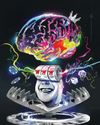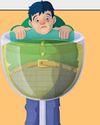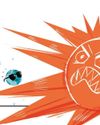
In 1990, while at Haverford College, I embarked on a transformative academic journey into biophysics the captivating intersection of physics and biology.
It was during this time that I delved into the tantalising notion of quantum mechanics operating within living organisms.
Unbeknown to me, this exploration would etch an enduring imprint on my scientific voyage, kindling a lifelong fascination with biophysics. Ultimately, I charted my research course in quantum cosmology, but the echoes of biophysics persisted.
One of the most potent strategies in unveiling new truths in physics arises from principles that unify seemingly disparate phenomena. Einstein's principle of relativity, for instance, harmonised electromagnetism with the fabric of four-dimensional spacetime.
Similarly, physicists like Richard Feynman and Paul Dirac achieved remarkable feats by bringing together disparate principles, uniting quantum theory with relativity to birth a new perspective on the quantum field. This yielded predictions like the existence of antimatter and the Standard Model of elementary particles, which have since been validated at particle accelerators around the world.
During my tenure as a physics professor at Dartmouth College, I met Dr Salvador Almagro-Moreno, a remarkable molecular biologist. Over numerous intellectual exchanges, Salvador and I discerned a common thread weaving through our distinct fields: the potential for a symbiosis between physics and biology.
Denne historien er fra December 2023-utgaven av BBC Science Focus.
Start din 7-dagers gratis prøveperiode på Magzter GOLD for å få tilgang til tusenvis av utvalgte premiumhistorier og 9000+ magasiner og aviser.
Allerede abonnent ? Logg på
Denne historien er fra December 2023-utgaven av BBC Science Focus.
Start din 7-dagers gratis prøveperiode på Magzter GOLD for å få tilgang til tusenvis av utvalgte premiumhistorier og 9000+ magasiner og aviser.
Allerede abonnent? Logg på

NOW YOU SEE ME, NOW YOU DON'T
Scientists around the world are working on ways to hide us from sight. But how close are we to developing tech that could make us invisible?

UNCORKED POTENTIAL
How much good can ditching drink for a month really do? Answer: a whole lot. In fact, science shows even short-term abstinence could unlock a cocktail of lasting benefits

Scientists discover when humans and dogs became friends
The relationship spans thousands of years, but experts might have pinpointed the first connection

Why it's so hard to kick a gambling addiction
We now know that gambling can be as addictive as drugs, but there are factors that can make it even harder to quit

How much could Ozempic change our world?
The weight-loss drug has made headlines and broken sales records, but what does it mean for our future?

WHY DOES DRINKING ALCOHOL MAKE IT SO MUCH HARDER TO LOSE WEIGHT?
While enjoying the occasional glass of wine or pint of beer may seem harmless, regular or excessive alcohol consumption can significantly hinder your weight-loss journey for a few reasons:

Why do so many New Year's resolutions fail?
Establishing positive new habits is hard at any time of year. But there are ways to stop your attempts ending in failure

'Extreme' solar radiation storm could hit Earth
Sun-like stars may have tantrums far more frequently than we thought

HOW CAN I BANISH THE JANUARY BLUES?
Dark mornings, long chilly evenings and short days; many people find January tough.

Neutrinos are getting in the way of dark matter detection
These troublesome particles are difficult to detect, but they're starting to show up in places where they're not wanted